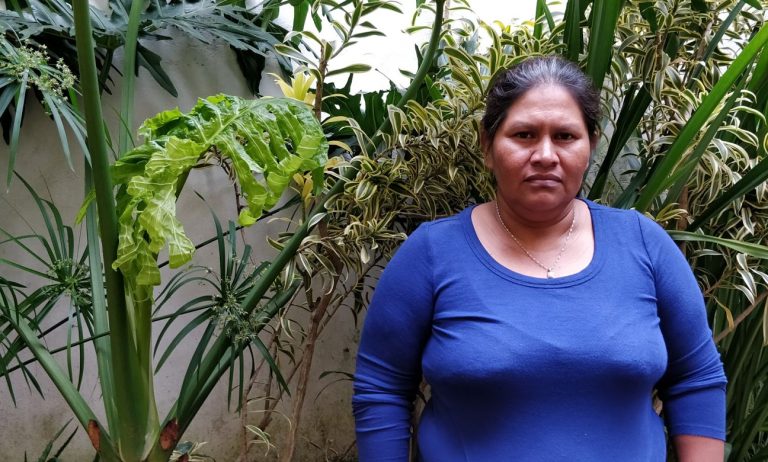30 de septiembre 2018

Children of Exile: The Births “Sowing Hope” in the Camp of Nicaraguan Farmers

PUBLICIDAD 1M
PUBLICIDAD 4D
PUBLICIDAD 5D
The rural leader has left Nicaragua and remains in Costa Rica. “They have forced us to migrate, but they haven’t silenced us".

Lideresa campesina es una de los 40 nicaragüenses que participarán en los eventos paralelos a la Cumbre de las Américas
The leader of the anti-canal rural movement, Francisca Ramirez, promises to fight from abroad against the regime of Daniel Ortega and Rosario Murillo. She said it from San Jose, Costa Rica, where she had to seek refuge, faced with a fierce government persecution. The same government that has imprisoned since mid-July the peasant leaders, Medardo Mairena and Pedro Mena, accused of terrorism and murder.
However, Ramirez states that she will continue her denunciations to “unmask the presidential couple” and she talks of on the persecution and death Nicaraguan peasants are living.
“The focus of our work here will be to unite (among the Nicaraguan diaspora). Our goal is to raise our voice to the world so that they will know that in Nicaragua we live in a difficult period,” she told Confidencial. According to the most recent statistics of the United Nations High Commissioner for Refugees (UNHCR), at least 23,000 Nicaraguans have requested asylum in the neighboring country.
Ramirez’s work in Costa Rica will consist in coordinating with university students and other Nicaraguans who, from abroad, denounce the government, whose repressive phase has worsened in recent weeks with the capture of hundreds of demonstrators that since April participated in the streets.
“The thousands of us (in Costa Rica) are going to organize ourselves and fight for our country, for our people, and for our lands. The idea is to meet with the movements that are here. We know that they are having a hard time because it is not easy to be a migrant in a country that is not your homeland, it is hard,” expressed this leader of the peasant movement, who promises to return “soon and be triumphant.”
“Dona Chica”, as Nicaraguans call her, has confronted the government of Daniel Ortega since 2013, when the Sandinista ruler announced Law 840, better known as the Law of the Grand Canal, which gives the rights of land use, water, maritime areas, and natural resources to Chinese businessman Wang Jing, through a shady concession to build this controversial interoceanic canal project. Since then, hundreds of peasants—many of them under the leadership of Ramirez—have protested in the countryside and in the cities under besiegement, persecution, and death.
“What occurred on April 18th [in the cities] we have lived since five years ago, but the people were blind. They believed in the discourse of the presidential couple that has been a false discourse to deceive the people. On April 18th the young students said enough and raised their voice against so much injustice,” argued this activist.
Since the massive demonstrations broke out in April, which have involved various sectors of society, dozens of peasants died in the “clean-up operation” orchestrated by the regime’s paramilitary, while others have fled to Costa Rica, even some wounded in the attacks.
“There are many peasants who were not even buried by their own family, many disappeared and were never found after the attack to the roadblock of Lovago, and a number of them migrated to Costa Rica because of the government persecution,” explained Ramirez.
In mid-July, National Police officers and paramilitary groups under Ortega’s orders attacked the roadblock located in the municipality of San Pedro de Lovago, Chontales. As a result of this armed incursion, several people were reported wounded, among them Gabriel Mairena, brother of the peasant leader Medardo Mairena. In the following days, an ambush and murder of peasants was reported, whose numbers are still undetermined.
At that moment, more than 125 roadblocks were counted that kept dozens of cities in Nicaragua paralyzed. This action was “significant,” as well as the appeal for civil disobedience and not payment of taxes pushed by merchants of the “Mercado Oriental”, until government-backed paramilitaries groups fired at citizens guarding the barricades put up as a “pressure and defense mechanism” in the neighborhoods and main streets of the cities.
“We do not consider that it has been a defeat, we see it as a victory because Nicaragua is no longer asleep and will achieve the freedom and democracy that we hope to have and justice for all those killed, as well as freedom for all the prisoners. We know that it is difficult with the dictatorship, but our voice will not be silenced” expressed Ramirez.
The peasant leader did not rule out that in the future she will attend several spaces where the nations of the world meet to discuss the crisis that the country is going through.
“We are not going to leave any space where we can denounce the dictator. We have been entrusted to be the spokespersons for the poor and that is why we are going to need more unity,” explained Francisca, who in a recent message addressed to Nicaraguans through her Facebook page said that from the countryside and the cities they will rise again to “suffocate this criminal dictatorship.”
PUBLICIDAD 3M
Periodista nicaragüense con tres años de trayectoria en cobertura de temas culturales y derechos humanos. Ganador del Premio Pedro Joaquín Chamorro a la Excelencia Periodística.
PUBLICIDAD 3D